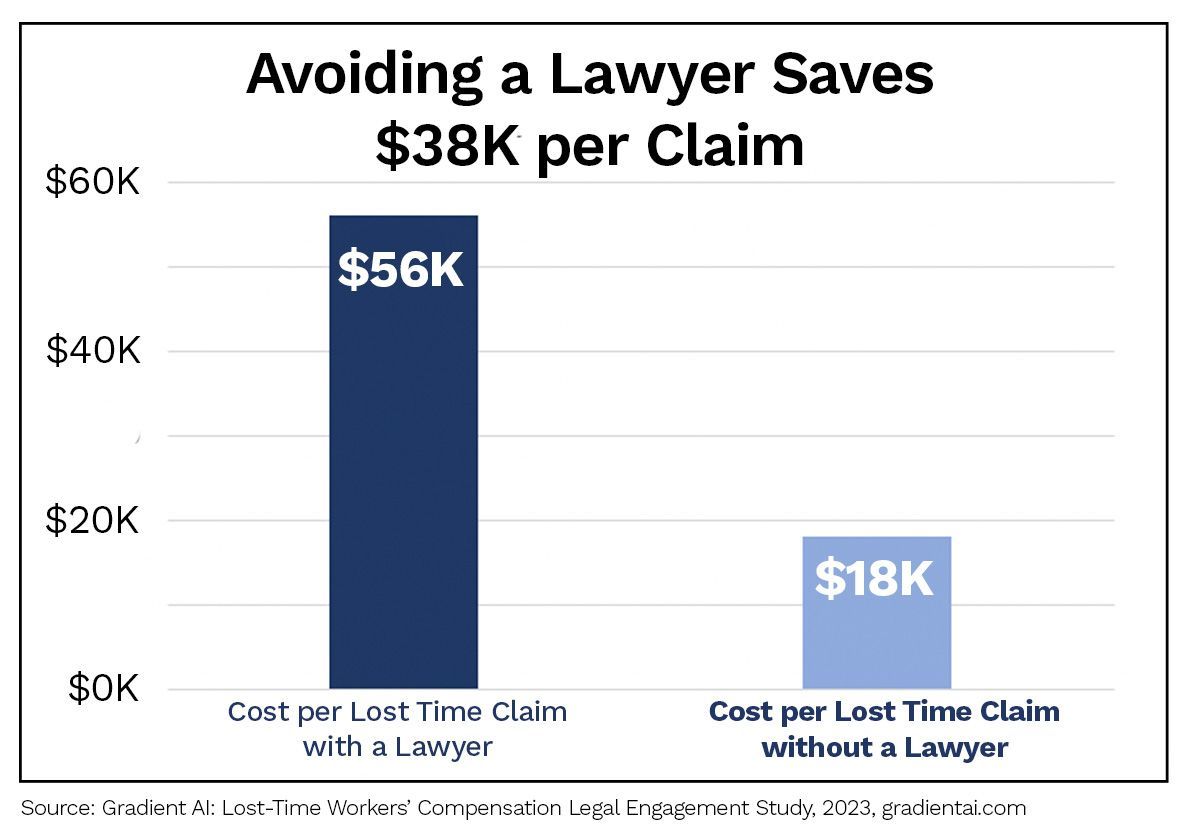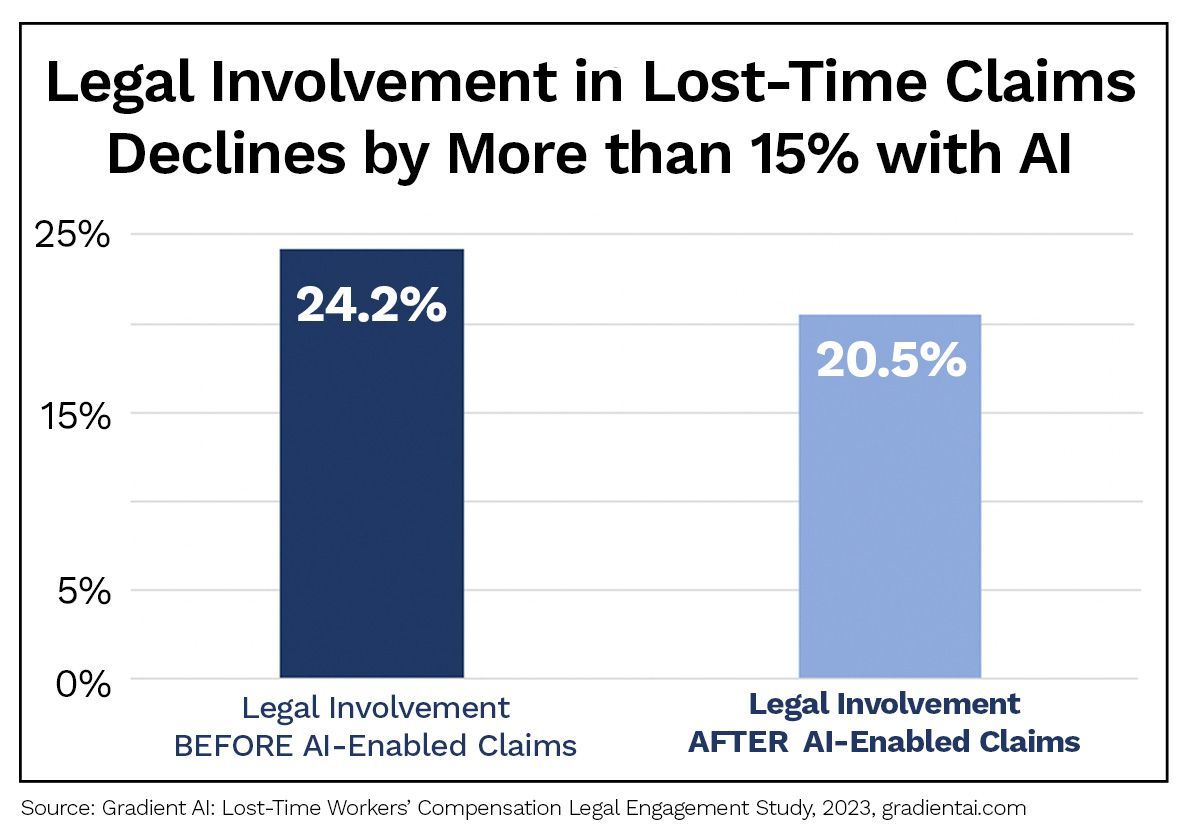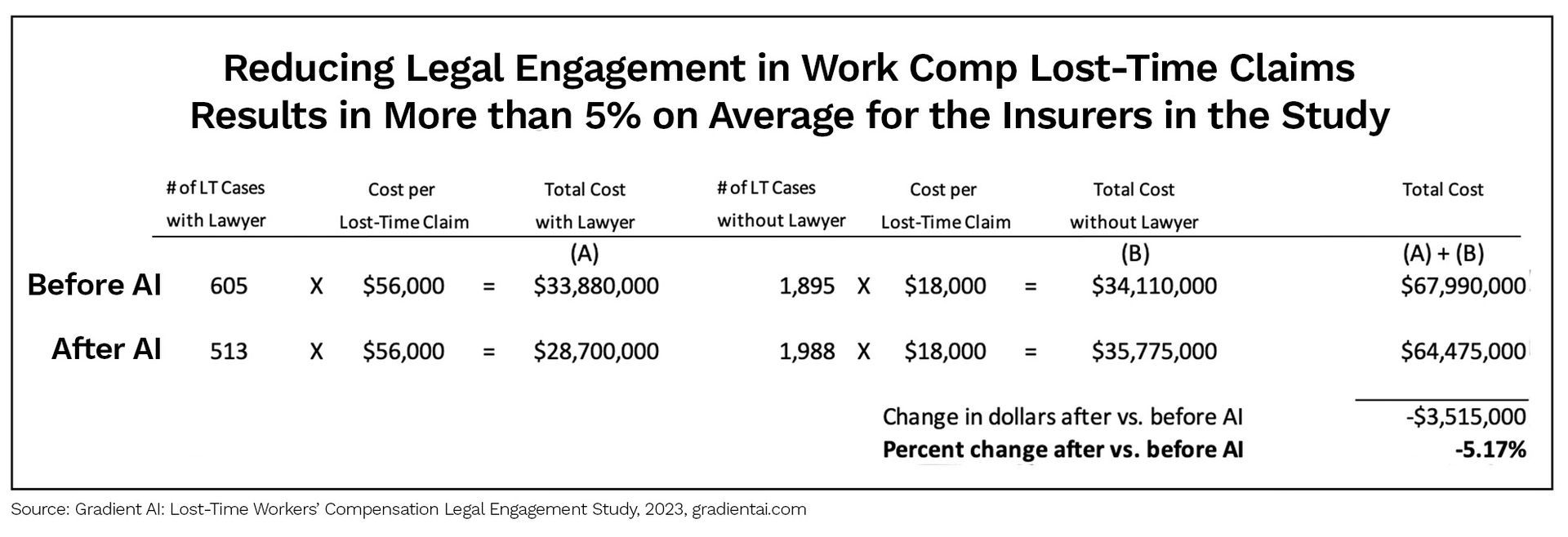Research Study: The Impact of AI on Workers’ Comp Lost-Time Claims Legal Involvement
Abstract
Gradient AI engaged in a research study of over 200,000 workers’ compensation lost time claims gathered from more than 60 insurance carriers over a 10-year period. The study found that integrating artificial intelligence (AI) models in Workers’ Comp claims management can reduce legal involvement in lost-time claims – the most expensive Work Comp claims – by 15%. This reduction translates into a 5% savings in claim costs, equating to an estimated savings of $3.5 million per year, based on the insurers in the study managing an average of $70 million in lost-time claims.
Legal involvement is a major cost driver in casualty claims, particularly in the context of lost-time claims. These are cases where an injury is severe enough to require the injured employee to remain out of work for an extended period of time.
Study Methodology and Goals
To better understand the efficacy of AI models trained on industry data lakes, Gradient AI’s data scientists conducted a comprehensive study on workers’ compensation insurance claims. They analyzed over 200,000 lost-time workers' compensation claims, collected from a diverse pool of more than 60 insurance carriers over a 10-year period. Within this dataset, half of the 200,000 claims underwent assessment prior to the integration of AI, while the remaining half were evaluated after AI implementation.
The study’s primary goal was to better understand AI’s potential to deliver value and shape critical decisions around workers’ compensation insurance claims – specifically in management of lost-time claims.
Key Findings
1) 15% Reduction in Legal Involvement:
Researchers found that lost time workers' comp claims involving lawyers cost 3x more than claims without legal involvement and lasted nearly 2x as long.

The study revealed that insurers leveraging AI effectively reduced legal involvement by 15% because AI models were able to assess claim complexities, predict the likelihood of legal involvement, and provide early warnings to claims adjusters.

2) 5% Reduction in Lost-Time Claims Costs:
AI's proactive identification of potential legal engagements resulted in a notable 5% reduction in lost-time claims costs, equivalent to an annual $3.5 million based on the study’s insurers averaging $70 million in lost-time claims. This savings was achieved by providing adjusters with early alerts regarding injury severity and changes in claims status. Early alerts enabled timely actions such as additional attention and outreach by the claims manager and proactive steps to arrange for additional medical treatment.

3) Mitigating the 3 Primary Reasons for Legal Representation:
Three key factors drive claimants to seek legal representation, and this study demonstrated that AI-based models provide early warnings enabling insurers to mitigate these factors:
- Erosion of Trust:
Prolonged open claims can erode trust between claimants and insurance adjusters over time. AI mitigated this by expediting the process, reducing the need for claimants to seek legal assistance.
- Fear of the Unknown:
Claimants often seek legal counsel as a safety net when facing severe injuries or doubts about recovery. AI provided insurers with the ability to proactively address these concerns, thus avoiding legal escalation.
- Intent to Litigate:
Some claimants are determined to pursue legal action. AI empowered insurers to intervene early, potentially averting costly legal engagement.
Conclusion
The research demonstrated that early warnings, based on AI models trained on an extensive industry data lake of workers' compensation policies and claims, enable insurers to proactively manage workers’ compensation lost time claims much more efficiently and effectively. This approach results in faster resolution, reduced legal involvement, and substantial cost savings.
The research also reaffirms that AI is a valuable tool in managing these claims, especially in avoiding costly legal fees and time-consuming litigation. The results not only show substantial cost reductions but also highlight AI's potential to streamline the claims process, benefiting injured workers, employers, and insurers.
© 2023 by Gradient AI Corporation. All rights reserved.
Media inquiries and study reprint requests may be directed to Elyse Familant.
Gradient AI publicly announced the results of this study on Sept. 20, 2023, via press release.

